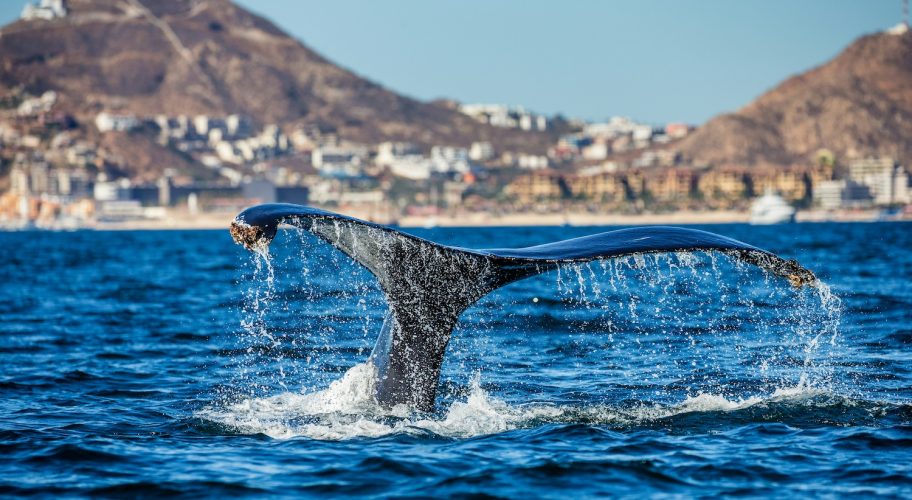The Movement to Stop Mega Ships from Sailing Across the Gulf of California

“This isn’t just a Mexican fight,” Alekz Aguila, a project officer at Conexiones Climáticas, told TriplePundit. “It’s not a fight exclusive to the Gulf of California.”
The Saguaro Energia project aiming to build a liquefied natural gas (LNG) plant in Sonora, Mexico, accompanied by an 800-kilometer pipeline and a marine shipping route through the Gulf of California is a multinational problem, Aguila said. It threatens the survival of animals vital to the waters along the West Coast of Mexico, the United States and Canada: whales.
Organized by the environmental organization Conexiones Climáticas, the Ballenas o Gas (Whales or Gas) campaign brings together more than 40 organizations in Mexico and the U.S to advocate against the project. Because it’s either the whales or the gas shipments in the Gulf of California, Aguila said. They cannot co-exist.
The shipping route
The Saguaro project is proposed by the U.S. energy company Mexico Pacific. If the project is allowed to proceed, the Sierra Madre pipeline would be constructed across the length of northern Mexico to transport methane from the fracking fields of Texas’ Permian Basin to the city of Puerto Libertad on Sonora’s coast.
From there, the project’s namesake LNG plant would be built to convert the methane into natural gas so it can be loaded onto mega tanker ships and sailed down the length of the Gulf of California — an UNESCO World Heritage site and one of the Earth’s most biologically diverse areas — on its way to Asia.
“We have a recurring question of why don’t they run this project through Texas and leave from the West Coast of California,” Aguila said. “It’s very clear that the answer is because the environmental laws of the United States won’t let them. They’ve picked the easiest exit, which is Mexico, because of the lack of regulation and in many cases because they see us as their backyard.”
The risks to whales
In addition to resident whales, numerous species migrate to the Gulf’s warmer waters in the winter including humpback, sperm, gray, blue and fin whales. The calm, nutrient-rich waters are vital for them to feed, mate, give birth and raise their young. Whale sharks, an enormous species of fish, also migrate to the area.
The whales are essential to the gulf’s ecosystem, which supports 900 species of fish — 90 percent of which aren’t found anywhere else — and 39 percent of the marine mammals on Earth, according to the advocacy network Greenpeace. This level of biodiversity was preserved because oversized ships and mega tanker ships have no reason to travel through the waters. The 300-meter-long mega tankers that would transport LNG through the Gulf for the Saguaro project pose an imminent threat to the whales and, in turn, other sea life. The gulf is traversed by ferries, cruise ships, yachts and fishing boats but all are much smaller, less destructive, and make less noise than these larger shipping vessels.
Large ships don’t brake for whales and collisions are often fatal, Vanessa Prigollini, the director of education for the Mexican conservation nonprofit Mar y Educación Ambiental, told attendees at a Ballenas o Gas event in La Paz, Baja California Sur, in January. She listed noise pollution as one of the top threats, adding that no possible route through the Gulf will leave the whales unharmed.
Noise pollution as the ships travel through the water would cause considerable damage to their population by interfering with whales’ ability to navigate, find food and communicate. It also causes disorientation, which makes collisions more likely. Large ships already displace whale populations worldwide.
“It is well documented that very large vessels, even mega cruise ships, arrive at the port with the carcass of a whale they hit, and sometimes they don’t even realize they hit it,” Prigollini told the news outlet Milenio.
A significant decline in the whale population would have devastating effects on the Gulf’s ecosystem and the people who live on Mexico’s Baja California peninsula, potentially shuttering fisheries and whale-related tourism. Much of the state’s economy depends on these two industries.
A decline in whales would also put ecosystems in the Pacific Ocean along the U.S. and Canada at risk. “It makes no sense to take care of the whales’ habitat in North America if their main zone of rest, of mating, giving birth is here,” Aguila said.
The Ballenas o Gas campaign
Ballenas o Gas aims to halt the Saguaro project to protect the whales, as well as the ecosystems and people whose livelihoods depend on them. Much of this work involves informing the public of the project and empowering people to speak out against it. It uses art as a form of education and protest.
“We have several campaigns,” Aguila said. “We brought together a Save the Whales network in schools.” The school campaign educates students from the lower grades to upper secondary about whales, culminating in drawings that are shared with government officials. Artwork from schoolchildren in eight Mexican states was displayed at Ballena Fest, a protest held in Mexico City in January 2025, featuring a variety of art and music, he said.
“We are also implementing another strategy, where murals are being painted in various parts of the republic,” Aguila said. “These murals tell the story through images, and they take you to the Ballenas o Gas website where you can learn about the problem. We are also talking with people who are directly affected by this situation in all of the microeconomies around the Gulf of California.”
That includes tourist providers and business owners across several coastal towns. “There are many families in this state and all around the entire Gulf that live directly or indirectly from the existence of the whales, because the whales provide an ecosystemic service that allows for fishing, for example, but also there is whale watching in the Gulf of California,” Aguila said. “It’s an important industry, it’s an economy that sustains many families.”
Ballenas o Gas is creating a network of allied businesses beyond the coast and across the country, he said. It gives public facing businesses like cafes, restaurants, and bars educational posters and stickers that direct people to sign the organization’s petition to save the whales. The petition asks the Mexican government to block the Saguaro project. So far, it’s garnered over 310,000 signatures.
While Conexiones Climaticas and other organizations have their own dialogue with government officials, Aguila noted the importance of citizen groups speaking for themselves. In that way, the government will have to answer directly to its constituents.
In addition to the activist campaigns, legal challenges were brought against the project. The Sierra Club and Public Citizen filed a lawsuit in the U.S. that disputes the Federal Energy Regulatory Commission’s decision to allow the connector pipeline between Texas and Mexico. The project also has several court cases filed against it in Mexico, resulting in a preliminary injunction from the courts that halts construction while legal action is pending. Now, Mexico Pacific’s permit to export natural gas from the U.S. to Mexico is about to expire. It’s asked for an extension, but with opposition growing, there’s no guarantee it will be granted.
That opposition can also put off investors, Aguila said. Organizers at Ballenas o Gas are hopeful the project can be stopped because it’s missing the most important thing: money. The project still needs another $15 billion in investment.
“Our intentions are that this project is so toxic that they do not want to invest,” Aguila said. “Toxic in the sense that there is a lot of citizen resistance, in that we’re not just a sole organization, but we have all of the technical, scientific, and climate support where there is no valid argument for this project to go through.”
Featured image credit: Getty Images/Unsplash



Post Comment